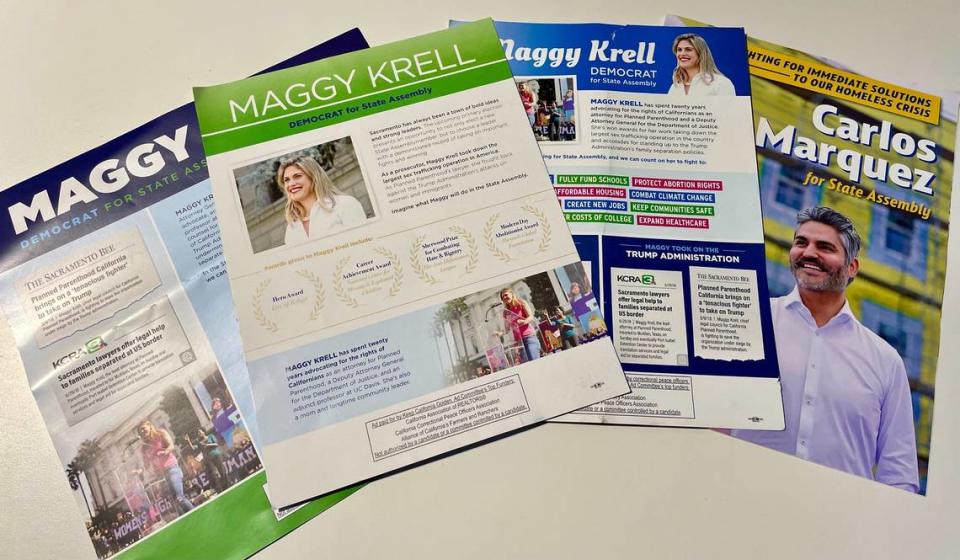California interest groups pump millions into Sacramento Assembly race. Who’s funding ads?
- Oops!Something went wrong.Please try again later.
California interest groups have already spent more than $1 million to back candidates in the crowded 6th District Assembly race, a contest that’s wide open since longtime incumbent Kevin McCarty opted to run for mayor of Sacramento.
The top two vote-getters in the March 5 primary will advance to the November general election. And committees representing interests ranging from dialysis clinics to charter schools have picked a handful of candidates to support with mailers and digital ads.
Nine committees have spent $1,148,973 on independent expenditure ads backing four 6th District Democrats as of Wednesday, according to the Secretary of State’s Office. That makes the Sacramento competition among the most expensive Assembly races in California.
Committees have spent the most money supporting Deputy Attorney General Maggy Krell and Carlos Marquez, former ACLU California executive director.
They’re running for a two-year term representing a district that covers most of the city of Sacramento. Rank-and-file Assembly members receive $128,215 per year, plus per diem money.
Election laws prohibit committees from coordinating these ads with campaigns. But the candidates can still benefit from ads sharing their faces and messages with voters who likely are not familiar with them at this stage in the race.
“All these independent expenditures really matter for the primaries in terms of who ends up advancing,” said Christian Grose, a professor of political science at the University of Southern California. “And it is hard for voters to know who these groups are, or what they want.”

Who’s paying for 6th District ads?
A handful of business and corrections-focused committees had spent more than $742,000 backing Krell, while a charter school group has supported Marquez with nearly $403,000 in ads as of Wednesday, according to the Secretary of State’s Office.
That’s more than both candidates’ campaigns have raised on their own.
Krell’s campaign received more than $430,000 in loans and contributions from late June through Tuesday, Secretary of State’s Office disclosures show. Marquez took in more than $227,000 during a similar time period.
Dialysis clinic chain DaVita spent the largest single amount on ads supporting Krell. It paid $300,000 for digital ads saying, “Maggy Krell won’t back down,” including a webpage with a 30-second video.
Tomorrow California — a committee bankrolled by PG&E, the California correctional officers’ union and the California Building Industry Association — spent nearly $45,000 on mailers touting Krell’s career accomplishments.
Another committee, Keep California Golden, spent more than $200,000 on Krell mailers. The group cites the California Association of Realtors, the correctional officers’ union and the Alliance of California’s Farmers and Ranchers as major funders. It also received money from Anheuser-Busch and cigarette-maker Phillip Morris.
When asked about the independent expenditure ads, Krell said the ones she has seen “accurately portray my legal accomplishments as Planned Parenthood’s lawyer and as a frontline prosecutor protecting sexually abused children.”
Kelly Calkin, a spokesman for Tomorrow California, said Krell impressed representatives from the different groups funding the committee during meetings. Tomorrow California’s backers do not look for candidates to check certain issue-related boxes, he said. The groups are looking for someone “thoughtful and considerate” about the state’s issues, not an ideologue.
“She would be a serious actor in the Legislature,” Calkin said.
Families and Teachers United, a committee backed by California Charter Schools Association Advocates, sponsored mailers highlighting Marquez’s positions on housing and homelessness. They show him shaking hands with a construction worker and voters and posing with Planned Parenthood advocates.
Marquez previously worked as senior vice president of the California Charter Schools Association, according to his campaign website.
Pat Dennis, Marquez’s campaign consultant, declined to comment on the independent expenditure campaign supporting Marquez.
Representatives for DaVita and Keep California Golden had not provided the Sacramento Bee with any comments by the time of publication.
How Sacramento election spending stacks up
The 6th District and other safely Democratic Assembly races without incumbents are top draws for independent expenditure spending to support and oppose candidates.
As of Wednesday, the 41st District contest to replace Assemblyman Chris Holden, who represents the Pasadena area in Southern California, had pulled in more than $857,000 in independent expenditure funds, according to the Secretary of State’s Office.
The 57th District race to succeed Assemblyman Reggie Jones-Sawyer, who represents South Los Angeles, had attracted more than $1.3 million.
Grose, the USC professor, said independent expenditures can be a form of early lobbying, and interest groups can be especially effective if they back the right candidates early in an election.
California is so dominated by Democrats that committees tend to back candidates based on their political leanings, meaning whether they trend more moderate or progressive, Grose said. In other states, they will choose who to support or oppose based on their party affiliation.
“I think in some ways, it gives the IEs a little bit more power, because there’s only one party that’s really in charge,” Grose said.

